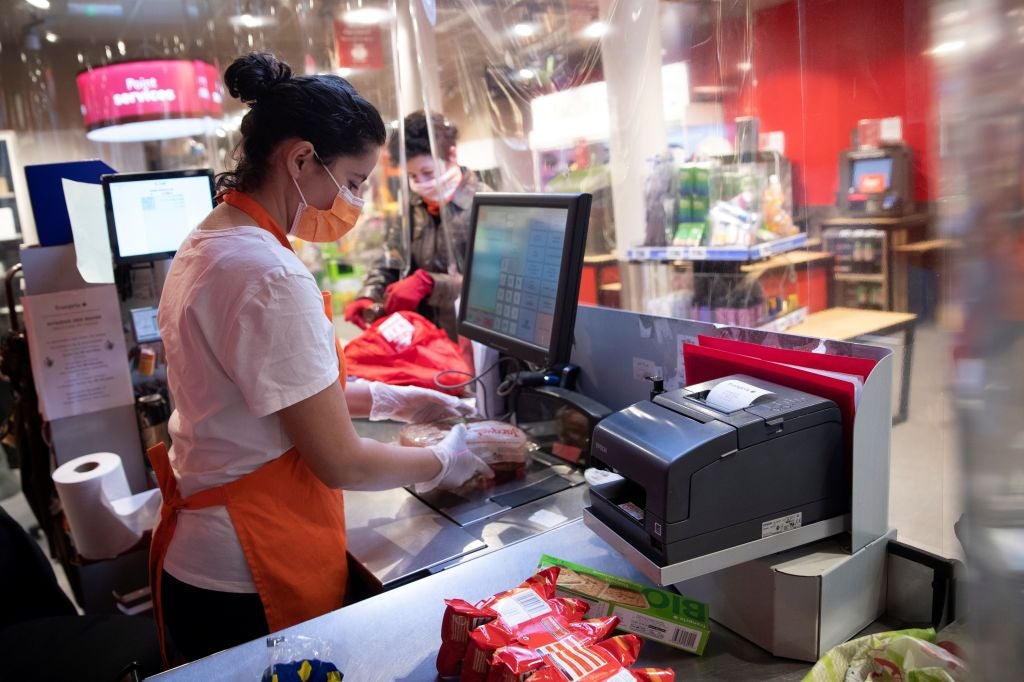Frontline supermarket staff risk their lives every day and deserve better pay
The pandemic has highlighted the value of those helping us put food on the table, let's give them a real living wage, writes Laura Gardiner


I was amused to receive a year-in-review email last week informing me that I had achieved the status of “number two purchaser of parmesan in 2020” in my local supermarket. I was also shocked to find out the number of trips I had made to that supermarket over the past 12 months.
My experience will be a common one. For much of the past year, staying at home has meant being more reliant than usual on our local supermarkets. Those supermarkets have responded impressively – swiftly making shops Covid-secure, adjusting opening hours, and delivering groceries to millions who’ve been asked to shield.
Supermarkets have been rewarded financially for these efforts – profits are strong, and Sainsbury’s, Tesco and Morrisons have reported bumper sales in their Christmas trading statements.
With families across the country once again in lockdown, it’s high time we recognise that the critical role that supermarkets are playing, and that their resilient financial position rests on the shoulders of their essential employees.
Supermarket staff are continuing to support families and the economy, while facing risks to their own health. Polling by the RSA showed that two-thirds of supermarket workers thought they faced a large risk of catching coronavirus at work in November.
This casts these employees’ low pay levels in a harsher light than ever. New analysis by the Living Wage Foundation shows that in April 2020, at the height of the first lockdown, close to half (45 per cent) of the 900,000-strong supermarket employee workforce earned below the “real living wage”. The government’s minimum wage stands at £8.20 for under 25s and £8.72 for over 25s. The real living wage, based on what people actually need to live, stands at £9.50 across the UK and £10.85 in London.
At the same time, major British supermarkets have some of the largest gaps between the pay of typical employees and that of their bosses. Tesco, Morrisons and Ocado are all in the top 10 FTSE 350 companies when ranked by CEO-to-median-employee pay ratios. The strange circumstances of this pandemic should prompt a rethink of the value that supermarkets place on their frontline workers, not just on those who head them up.
The challenges that supermarket employees face go beyond low pay – they are more likely than average to experience underemployment. Some 19 per cent of supermarket sector employees reported that they wanted to work more hours than they are were given during April-September 2020, compared to just 10 per cent of employees across other sectors.
Strangely, this figure for supermarket employees in the first six months of the pandemic was higher than the 16 per cent recorded in the six months prior, suggesting that even as sales in supermarkets swelled many supermarket workers had hours that fell short of what they wanted and needed.
Britain should not let this situation continue for a moment longer – the RSA’s polling shows that two-fifths of supermarket workers expect to burn out this winter. And a similar proportion feels society does not recognise the contribution they are making.
We welcome the news that Morrisons has announced a pay rise for store colleagues to £10 per hour from April, meaning store colleagues will be paid at or above the real living wage. It’s unclear as to whether the new rate of pay will apply to outsourced cleaners, security guards and trolley collectors – we'd love to see Morrisons pledge to commit to paying all its staff a real living wage.
Morrisons has the honour of being the first supermarket to offer a real living wage for store colleagues – and hopefully will prompt other major retailers to follow suit.
All supermarket employees should be able to put food on their own tables, as well as ours.
Laura Gardiner is director of the Living Wage Foundation




Join our commenting forum
Join thought-provoking conversations, follow other Independent readers and see their replies
0Comments